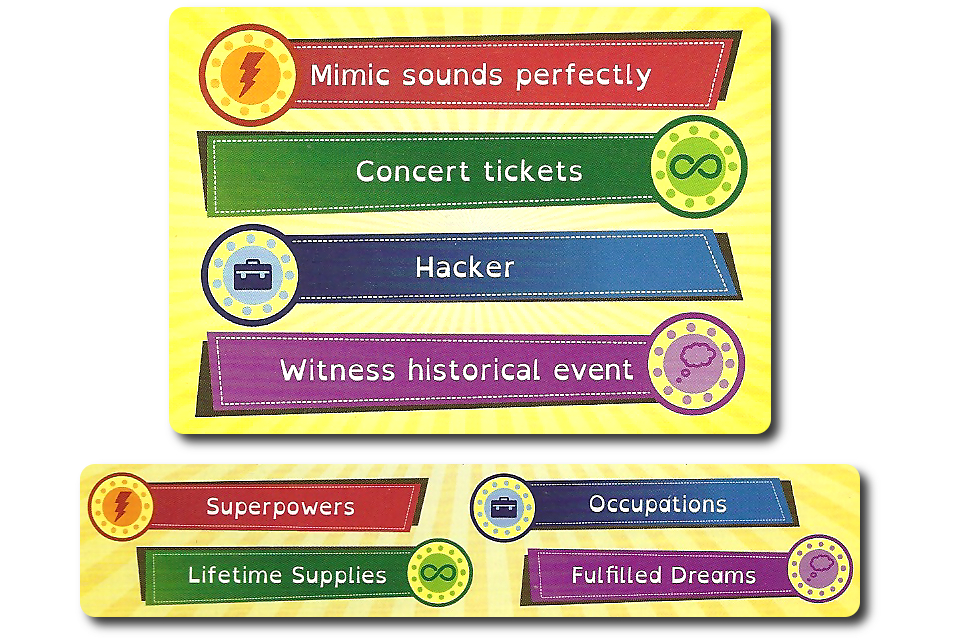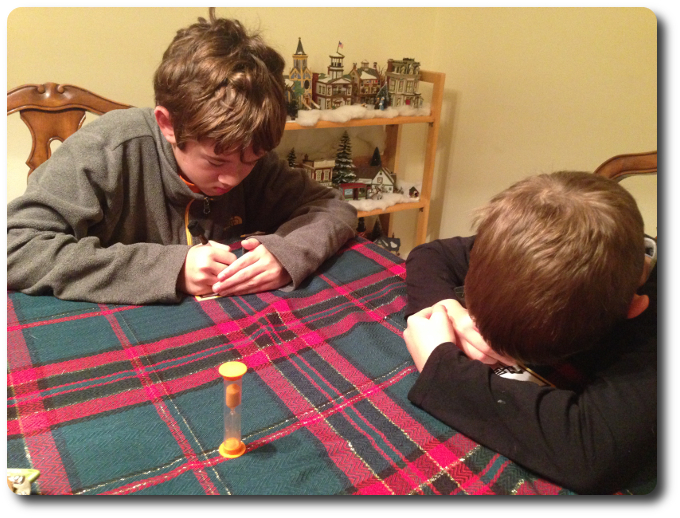
The Basics:
- For ages 8 and up (publisher suggests 13+)
- For 4 or more players
- Variable game play length
Geek Skills:
- Active Listening & Communication
- Counting & Math
- Logical & Critical Decision Making
- Reading & Writing
- Imagination
Learning Curve:
- Child – Easy
- Adult – Easy
Theme & Narrative:
- On every parade a little rain must fall
Endorsements:
- Gamer Geek mixed!
- Parent Geek approved!
- Child Geek approved!
Overview
American businessman, music publisher, writer’s representative, filmmaker, and record label executive, Allen Klein, said “You may not be able to change a situation, but with humor you can change your attitude about it.” One person’s good luck could be a source of envy or the butt-end of a joke. In this game, the better the news, the funnier the ironic outcome.
Stipulations, designed by Dustin Bluhm and published by Black Light Games, is comprised of 80 Stipulation cards, 4 blank Stipulation cards (for player customization use), 24 Bonus cards, 8 small whiteboards, 8 dry-erase markers, and 1 sand timer. The cards are slightly thicker, but just as durable as your standard playing card. The whiteboards are made of thick cardboard and are just big enough to easily use without taking up a lot of room at the gaming table. The dry-erase markers wouldn’t be worth mentioning if it weren’t for the fact that the game publisher decided to include an erase on the ends of each marker, making it unnecessary to get a wad of tissue for each player to clean their whiteboard. My sand timer had orange sand it in, which is a first for me and pretty cool.
Game Set Up
To set up the game, first give each player 1 whiteboard and 1 dry-erase marker.
Second, separate the Bonus cards from the rest of the Stipulation cards. Shuffle the Stipulation cards and set them face-down in the middle of the playing area. Leave room for a discard pile.
Third, shuffle the Bonus cards and place them face-down next to the Stipulation draw pile.
That’s it for game set up, determine who will be the first Judge and hand them the sand timer.
The Upside to Cynicism
Stipulations is played in game turns with the number of turns in a single game based on the number of players. A game turn is summarized here.
Step 1: Draw and Read Announcement
The current Judge of the game turn draws the top-most Stipulation card and selects 1 of the 4 possible announcements to read out loud. On the backside of every player’s whiteboard is a key that identifies what each option represents. In total, there are 4 different categories. These are Superpowers, Occupations, Lifetime Supplies, and Fulfilled Dreams. Since the Judge won’t be writing anything on their turn, they should feel free to turn their whiteboard over.

The Judge’s announcement will be used by the rest of the players to craft their cynical response by providing an unfortunate (and hopefully funny) stipulation to the Judge’s sudden good fortune.
After selecting an announcement, the Judge reads it out loud using language appropriate to the category and then flips over the sand timer.
Step 2: Let’s Get Negative
All the players except the Judge now write a response to the Judge’s announcement. The response needs to follow 3 simple rules.
- The response must be relevant to the Judge’s announcement.
- The response must make the Judge’s announcement less desirable.
- The response must be different than the last provided response by the player during the previous game turn.
Confused? Don’t be. Let’s look at some examples.
Announcement: “I have unlimited paid vacation days!”
Response: “But only when you take vacations at the office.”
Announcement: “I have a powerful magical weapon!”
Response: “That makes ice-cold ice.”
Given the three above rules, the rest is up to the player. They have until the sand timer runs out, at which time the Judge will call for all players to put their dry-erase markers down. Any player who did not complete their response should announce it to the group at this time. These players will not be participating for the duration of the game turn.
Step 3: Raining On Your Parade
The Judge now draws the top-most Bonus card and reads it to themselves. The Bonus card will be awarded to a player the Judge feels meets the Bonus card criteria. If the Bonus card is not applicable to the Judge’s selected announcement, they can draw a new Bonus card after reshuffle the Bonus card draw pile. Bonus cards are never discarded.
The player left of the Judge collects the whiteboards from the players who completed their response, randomizes them, and then read each response out loud. The Judge listens to each response and must decide which is the least favorable in accordance to their selected announcement. That is, which provided response not only makes the announcement fall on its face, but fall on its face after being dropped a mile above a pool full of sharks. In short, really turns the positive in the announcement in a huge negative.
Seeing that the selection process is completely subjective (there is no strict criteria), the players will most likely play to the Judge’s humor. Which is exactly what you want all players to do. The responses should not only follow the guidelines, but be as humorous as possible. Laughter is expected and encouraged.
After the Judge has heard all the responses, they announce which they found to be the least desirable. If the Judge believes a response did not follow the 3 simple rules, they can ignore it, removing it from the lineup of possible responses to select. The player who provided the selected response is awarded the Stipulation card.
The whiteboards are now returned to each player and the responses erased after the players reveal who wrote what. The Judge, however, is not done. The Bonus card must be awarded to 1 player. The player gives the Bonus card to the player they feel best met the Bonus card criteria. It should be noted that the Bonus card criteria does NOT influence the Judge’s selection of least desirable response. This means it’s possible for 2 players per game turn to score 1 point. The player who the Judge selected based on their response and the player who is awarded the Bonus card. Of course, it could also be the same player if the Judge deemed it so.
Step 4: Next Game Turn
The game turn is now over. The player to the left of the Judge is the new Judge for the next game turn.
Ending and Winning the Game
The game turns continue until each player has had an opportunity to be the Judge twice. The collected Stipulation and Bonus cards are counted and the player who collected the most wins the game.
Game Variants
There are a number of small game variants that can be included to enhance and slightly alter the game play. Each are summarized here.
Closing Arguments
This game variant gives each player an opportunity to champion their response, arguing why their offering should have been selected by the Judge who wouldn’t recognize “genius” if it bit them in the butt. The Judge’s selection does not change.
TMNT
This game variant allows the Judge to select 2 categories, mutating and mixing the announcement. Game play does not change.
Too Cool for School
This game variant puts the whiteboards aside and challenges players to provide their stipulation verbally to the group instead of anonymously. This method of play is recommended for groups that have more players than there are whiteboards.
Double Trouble
This game variant allows players to provide 2 responses to the Judge’s announcement. Both will be used by the Judge to determine which player is awarded the cards.
Play Nice
This game variant challenges the players to provide responses that would not result in bodily injury or death of the Judge if their announcement were to be true. This is more challenging than it might first appear, as the most logical negative response to any positive announcement is the unforeseen demise of the Judge. Thus resulting in a death sentence loaded with irony. No such shenanigans are allowed here. Each response must negate the benefit of the announcement by the Judge, but the results must leave the Judge intact.
To learn more about Stipulations, visit the game’s web page.
Final Word
The Child Geeks certainly enjoyed themselves, finding entertaining and creative ways to rain on the Judge’s parade. Their enthusiasm dwindled a bit towards the end, as did their creativity (some drew pictures as answers), but never their desire to keep playing. According to one Child Geek, “I like these kinds of games. They make you think about funny things and everyone is always laughing.” Some of the Child Geeks felt that the stress to constantly make people laugh was a bit too much at times, but this was only observed towards the end of the games. As one Child Geek put it, “You get tired of constantly trying to out do others and always being funny.” Regardless of the fatigue felt by some due to being overly hilariously ironic at times, the Child Geeks still voted to approve Stipulations.

The clock is ticking and the Child Geeks rush to provide the best possible worst stipulation
The Parent Geeks very much enjoyed the game and their observable level of enthusiasm and energy didn’t waver one bit. According to one Parent Geek, “This is a perfect game for a mixed group. It’s easy to teach, easy to play, and always makes people chuckle.” Emphasis here on “chuckle”. The game was enjoyed, to be certain, but it did not always produce mirth. As one Parent Geek put it, “Sometimes I cannot think of anything that will be a winner. I just write something down and want the game to hurry up to the next player’s turn.” Put another way, creativity is at the center of the game. If a player doesn’t feel inspired, points and opportunities may be lost. The majority of Parent Geeks enjoyed the game, resulting in its approval.
The Gamer Geeks took Stipulations to strange new places where it might not have been intended to go. Think Cards Against Humanity and you’ve got a pretty good picture in your head about how some of the Gamer Geeks slanted the game to meet their humor. This is not a bad thing, however, as it demonstrated that Stipulations is flexible enough to be played by children and by adults who act like children. According to one Gamer Geek, “The game’s best feature is its ability to adjust itself to whatever player is the Judge and whatever players are writing stipulations.” The Gamer Geeks enjoyed the game, but became bored with it. They found the Bonus cards to be interesting at first, but quickly realized they were nothing more than additional points to be earned, not challenges to be conquered. As one Gamer Geek put it, “As soon as you’ve finished one game turn, you’ve experienced the entire game from start to finish.” When the votes were in, roughly half of the Gamer Geeks found Stipulations to be a game they would play again, while the other half would never miss it.
Stipulations, like most Party games, is dependent on the players. More so than other games, since the energy and flow of the game is powered by the people. Other games have rules and procedures that keep the game going. Decisions to be made are offered by cards in the hand, rolls of the dice, or information provided by the game board. In Party games, what a player can and can not do is very loosely defined to provide maximum creative expression. Which is problematic only when you don’t have creative people or are with a group with not much energy. This is something we watch for when we play Party games so as to ensure we do not incorrectly review it based on outside forces that have nothing to do with the game itself.
In the case of this game, the energy level never really peaked, but nor did it fall to such a point where players were sleeping. Stipulations kept the players engaged just enough to keep them interested and required just enough creative input to tax them to a point where the effort being put in felt like it was efficiently producing a satisfying output. Individual player thoughts on the subject differ, of course, but not to a point where they widely differed. The vast majority found the game to be entertaining, challenging, and engaging.
Little was said about the role of the Judge. To some extent, this is the least interesting aspect of the game, but I beg to differ. I found the Judge role to be the single most important role during the game as the Judge sets the tone of the game turn, builds off the previous Judge’s standards, and raises the bar. If they do not, the game does not grow in creative demand. It also serves as a brief repose, allowing the player to set the stage instead of act upon it.
As Party games go, Stipulations is entertaining, but not altogether world shaking. It does its job but at no time did I feel like it was attempting to break new ground or challenge players to take their Party games in a new direction. Stipulations is, if nothing else, firmly built on tried and true game mechanics and methods of play. Individuals familiar with Party games will not feel like they are playing anything new as a result. The ones who will benefit the most are those who are not familiar with Party games. Stipulations is well designed and smartly executed. This is is a solid Party game and one that will certainly make your players smile.
This game was given to Father Geek as a review copy. Father Geek was not paid, bribed, wined, dined, or threatened in vain hopes of influencing this review. Such is the statuesque and legendary integrity of Father Geek.

